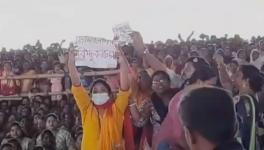Karnataka: Marginalised Communities Testify About Mental Health Issues, Usury, and an Uncertain Future for Children
Kavitha and Gayatri address the gathering
Rajeshwari, who lives in Bengaluru, wept as she said that her daughter’s school has been refusing to issue a transfer certificate to her child. She works as a daily wage labourer in the city and lost her source of livelihood during the lockdown. As a result, she could not pay her daughter’s fees, which were now in excess of Rs 50,000. Her daughter, Akshaya, 14, has not been attending school for two years and is facing a future of uncertainty.
On March 22, a public hearing was organised in Bengaluru by Action Aid and Slum Mahila Sanghatane to appraise public officials about the plight of various children who have lost two years of education to the COVID-19 pandemic. Single mothers and orphans also testified before representatives of the state government. People from at least four districts of Karnataka had turned up with representations. Most of the attendees were dalits and Muslims.
A concerned parent speaks at the hearing
Various accounts of mental health breakdowns have been reported during the pandemic. Out-of-school children have been severely impacted as well. Kavita and her husband were working in the garment sector in Mysore before the pandemic struck. They both lost their source of livelihood during the lockdown and were forced to take their son, Sharath, out of school. He is supposed to be in the seventh standard but remains in the fourth standard because he has been out of school for more than two years. She says that the time at home has been tough on his mental health.
“I have three children, and I wanted to ensure that my son got an English-medium education. But after the lockdown, we lost our livelihood and were unable to pay his fees. My son was not allowed to take his exams because the school asked us to clear all the dues. Since we haven’t been able to arrange the money, the school has refused to give his transfer certificate as well. Sometimes he acts mental at home. So I enrolled him in tuitions, but he is unable to learn anything.”
Some women testified that they had been prey to predatory lending.
Gayatri, from Bengaluru, says she took two loans of Rs 30,000 at an annual rate of 120% interest to pay for expenses.
“Since we don’t have a phone, none of my three children could attend online classes during the lockdown. However, when classes restarted, the school demanded fees for the last two academic years as well. Since we couldn’t pay the amount, they did not allow my daughter to write her exams. She called me from school saying that only she had been stopped from writing exams and that other children were laughing at her. When we asked for a TC, they refused to give that as well until we cleared all the dues.”
While she is prepared to shift her children to a government school, her children are not happy about it since they feel they will struggle to learn in a Kannada medium of instruction. Gayatri and her children are Tamil speakers and are not proficient in Kannada. She requested the government to set up more English-medium schools.
Asma Banu’s son, Syed Faizan, is 13 years old and has learning disabilities. He was studying in an English-medium school in Bengaluru but has been forced to drop out.
“My husband is a daily wage labourer and used to earn around Rs 400-500/day. We lost all our savings during the lockdown and were forced to sell whatever we could in order to survive. My son is a little slow and also has a thyroid problem. He keeps asking us to enrol him in school, but we cannot afford his fees.”
Dalit youth from Belagavi and Bagalkote also spoke at the hearing. They testified that poor bus connectivity in rural areas and a lack of toilets was keeping children out of school.
Three representatives from the government were in attendance. One of them was Narasimaiah, director, Primary Education Department. He said a circular was issued to private schools, informing them not to deny a transfer certificate to children, irrespective of fee dues. He requested the families to approach his department and ensured that the transfer certificates would be arranged.
Dr Devaraj, joint director, Department of Social Welfare, urged families to enrol their children in residential schools established for SC/ST children.
“Most of the IAS and KAS officers have studied in government schools. So please don’t hesitate to enrol your children there. These schools offer English medium education as well,” he said.
Dr Anjum Nafees, general manager, Karnataka Minority Development Corporation, appeared to blame the parents for not taking advantage of government schemes. She said that there are residential schools for children and self-employment schemes for parents without an income. She said that parents should visit the website of the minority welfare department and learn about the schemes. At this point, some parents pointed out that they were uneducated and did not have access to this information. Dr Nafees provided a toll-free number for parents to gather more information about government schemes.
Get the latest reports & analysis with people's perspective on Protests, movements & deep analytical videos, discussions of the current affairs in your Telegram app. Subscribe to NewsClick's Telegram channel & get Real-Time updates on stories, as they get published on our website.
























